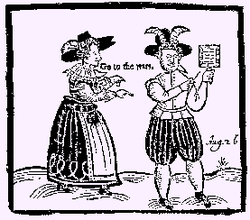 I haven't been posting very much in my blog, and I feel guilty about it. I know I'm 'supposed' to maintain an active author presence. But sometimes I just come and stare at my blog and think what am I supposed to do with you today? Then I make the mistake of checking out my blog statistics thinking 'well, maybe no one is reading these posts anyway,' and then I'm chagrined and amazed (and okay, maybe a bit happy) to discover that I still get hundreds of individual hits a day, even when I haven't posted in a while. But that's when the gnawing comes in: Are people waiting for something from me? So my thinking always goes something like this, all in one spinning, dizzy, and finally stultifying breath: "I should write a post. Probably something related to the seventeenth century, because that's what I know really well. But I don't feel like spending the time researching that topic right now. Okay, so maybe I should write about writing. But what do I really have to say about writing? I could write about my book progress, but I talked about that already. Ugh. I have nothing new to say." Given that my most popular posts are on cuckold jokes and the origins of dogs playing poker, sometimes its really hard to know what other topics could possibly be as interesting. Apparently I have blogger's block, a phenomenon perhaps not as well-known as other more interesting writing maladies, but I suffer from it nonetheless. We-l-l-l, I'm sure blogger's block is just a form of writer's block. And a quick glance at the all powerful internet shows that there are strategies for overcoming said blog blockage. But for me, blogger's block doesn't truly stem from a lack of blog ideas (although that's clearly part of it), it stems from trying to write out of guilt rather than out of pleasure. Guilt is a low-level motivator. Guilt doesn't promote creativity. And writing out of guilt isn't inspiring; instead, it snaps the spirit. But I love my blog, and I don't want to write out of guilt. So with any luck, I'll be inspired by some new cuckold stories soon or something equally silly. Did I ever tell you the one about the candlemaker, the cockswain and the cuckold? Boy, that's a good one...
0 Comments
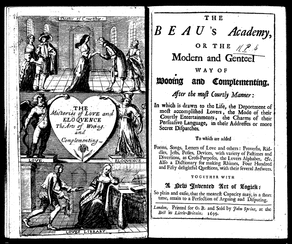 The beau's academy, 1699 Wing / 2854:35 In honor of the new year, I thought I'd offer some words of wisdom from the late 17th century. Granted, these words came from Edward Phillips, The beau's academy, or, The modern and genteel way of wooing and complementing after the most courtly manner (1699). So basically a book on how to be witty with the ladies. I selected a few of Phillips' -er- wisest statements and accompanying commentary (although a few are a tad hard to understand).
On prudent spending: He that spends beyond his ability, may hang himself with great agility. For he is lighter than he was by many a pound. (I have to say, this is one of Phillips' more sensical statements!) On the perils of whispering sweet nothings: Good words cost nothing. Unless it be love verses, for some men do pay. On fighting: He that cannot fight let him run. Tis a notable piece of Machiavelian policy. (I'm envisioning some poor battle-shocked Redcoats being relieved of their weapons and released to the elements....Machiavelian indeed!) On cooking: Better no pies, than pies made with scabby hands. (um, definitely one to keep in mind!) He's an ill cook that licks not his own fingers. (Methinks Tom Colicchio would concur!!!) On being a good provider: Good at meat, good at work. Therefore, 'tis the best way always to eat stoutly in the presence of women. (Got that, men?) ...and a few I can't easily categorize, but which sound a little naughty: Of idleness, comes no goodness. For that is the reason so many maids have the green sickness. (The "green sickness" [chlorosis or hypochromic anemia] was once considered "pecuilar to virgins." So being idle won't do anyone any good!) Hungry dogs love dirty puddings. There's many a man hath lost his nose by verifying this proverb. (I'll let someone else interpret this one!) Just a little something to ponder!!! 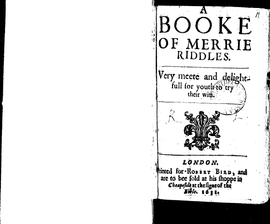 1631 STC /1476:06 Riddles, jests and other merriments always sold well in seventeenth-century England. Then, as now, people enjoyed a good laugh--being surrounded by plague, terrible sickness, fire, Puritans, etc may have had something to do with that! When I came across A Book of Merrie Riddles--claimed to be "very delightful for youth to try their wits"--I couldn't resist offering a few to YOU. Let's see what you make of these seventeenth-century jests. First, I'll give you few questions with solutions. Then, I'll give you a few without; see what you come up with. Question: I wound the heart and please the eye. Tell me what I am, by and by. Solution: Beauty. Question: When I did live, then was I dumb, and yield no harmony: But being dead, I do afford most pleasant melody. Solution: Any musical instrument made of wood. Easy, right? Of course there are a few a little more inscrutable today: Question: Who wears his end about his middle once in his time? (I would let you figure out this one, but it's pretty contextually situated.) Solution: A thief whose arms are tied with the halter, wherewith he shall be executed. Hmmm.... So here are a few more...what do you think are the solutions? Question 1: I do walk, yet I do not go. I do drink, yet no thirst lack; I do eat, yet do not feed; I do wake, yet no work make. What am I? And another: Question 2: I was not, I am not, I shall not be, yet I do walk as men do see. What am I? ********************************************************** Let me know: Are you as smart as a 17th century youth? I'll post the answers soon..... *********SPOILERS!!! Solutions ahead!!!***************
I figure that's sufficient space, if you're really concerned. Question 1: so, so, SO LAME. The solution is "Someone moving about in a dream." Question 2: so, so, so, SO, SO, SO LAME! (or fiendishly clever, you decide). The solution is "A person with the surname of 'Not'." As in Susie Not. NOT!!! 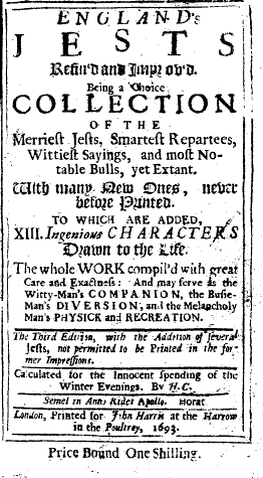 So if you're at that seventeenth-century dinner party that I mentioned in my last post, you'll want a few "merry jests, smart repartees, witty sayings, and a few notable bulls" to amuse and delight your friends (that is, if you want to transcend urine tricks and flatulence). (Not jokes though--apparently the word joque, from the Latin iocus "jest, sport, pastime'--had only just emerged in England in the 1660s, and was only just entering the seventeenth-century vernacular.) This particular jest-book, Humphrey Crouch's England's Jests Refin'd and Improved (1693), one of England's first such collections, offers equal opportunity digs at all manner of people: gentry, magistrates, royals, Quakers, Catholics, priests, Jews, foreigners, scholars, students, old people, young people, pregnant women, scolds, rakes, brothel-keepers, cuckolded husbands, criminals awaiting execution--you name it. Many jests were political or religious in nature but, as you might imagine, such humor doesn't always translate easily across three centuries (and English doesn't always translate to American. HA!) However, this one just amuses me. "A witty young fellow was try'd for his life, since his Majesties Restoration. And being caught, they told him he must be hang'd: But he pleaded in his own defence a long time; at last desir'd the Judge, That if he must be hang'd, he might be hanged after the new way that Oliver was, three or four years after he was dead." (The corpse of the Lord Protector Oliver Cromwell had been dug up and hanged posthumously two years after Charles II was restored to the English throne. Yup, as gross as it sounds.) And, I could skip the obligatory lawyer jest but I won't. "A certain person speaking unseemly words before a Gentlewoman, she ask'd him what profession he was of. Madam, says he, I am a civil lawyer. Alas, Sir, she replied, If Civil lawyers are such rude people, I wonder what other Lawyers are." Mwah ha ha! Civil lawyers. (Okay, fine. Maybe not that funny) Of course, I imagine bawdy humor will still translate best.... "Two friends meeting, one being overjoyed to see the other. Hark you Sir, said he, Between you and I, my wife's with child. Faith, cry'd the other, you're a liar, for I have not seen her this twelve months." (Awk-ward!) "A young woman, having married a great student, who was so intent on his studies, that she thought herself too little regarded by him, and one day when they were at Dinner with some Friends, she wished herself a book, that she may have more of her Husband's company. If it must be so, says her husband, I wish thou wert an Almanack, that I might change thee for a new one once a year." (Ouch!) 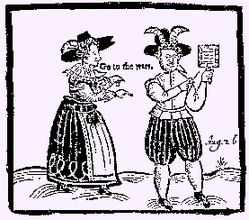 the witless cuckolded husband (with horns!) "One that had only been married but a week called her husband a 'cuckold,' which her mother hearing, reproved her: You slut, says she, do you call your husband cuckold already?And I have been married this twenty years to your father, and never darest tell him of it yet!" (Ah, the old cuckolded husband jest). So you tell me...how would this jest end? A cuckold, a magistrate, and a Puritan walk into a tavern... |
Susanna CalkinsHistorian. Mystery writer. Researcher. Teacher. Occasional blogger. Categories
All
Archives
May 2023
|
 RSS Feed
RSS Feed